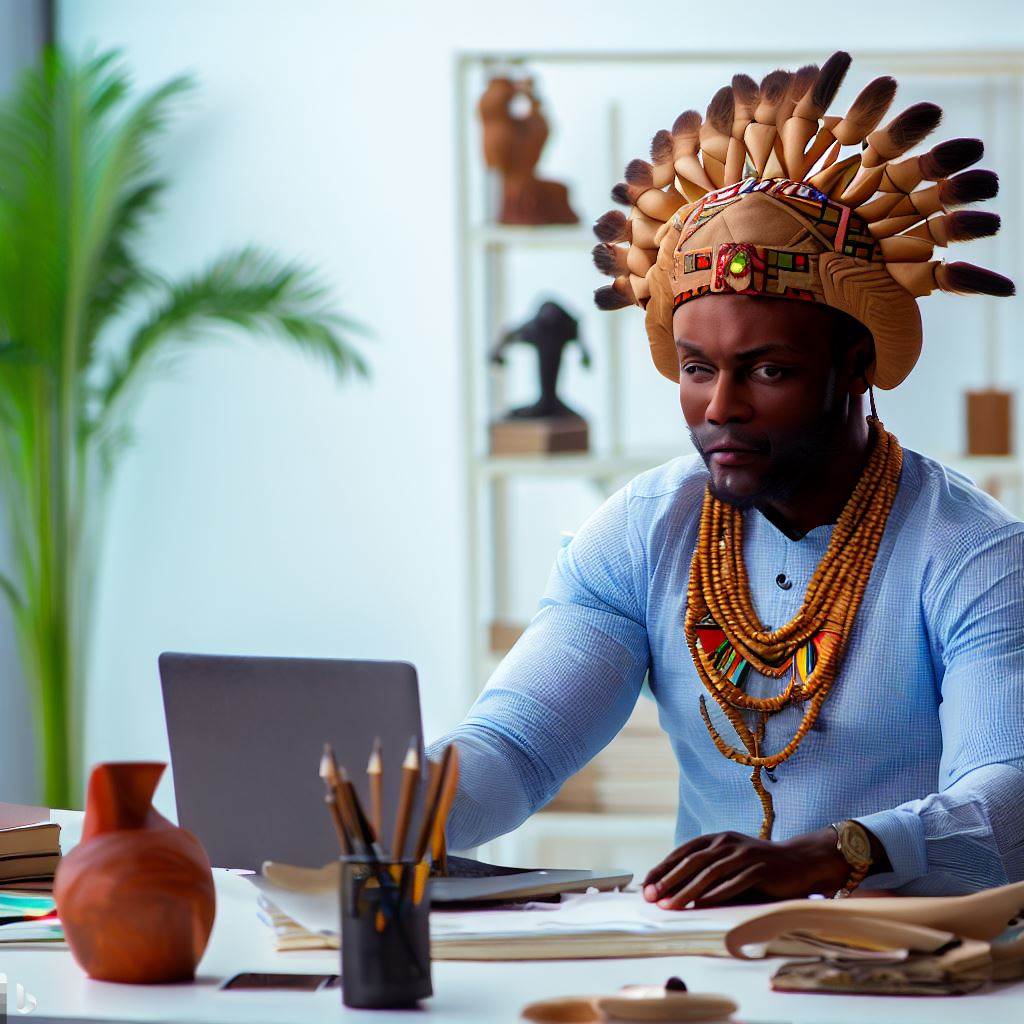Introduction
Networking is a crucial aspect of success in any industry, and the world of production design in Nigeria is no exception.
In this fast-evolving field, where creativity meets technical expertise, forging connections and collaborations can open doors to new opportunities, inspire fresh ideas, and ultimately elevate the quality of productions.
This brief explores the significance of networking for production designers in Nigeria, shedding light on how it can positively influence careers and contribute to the growth of the industry.
Definition of production design
Production design is the process of creating the visual and aesthetic elements for films, TV shows, and theater.
Importance of networking for production designers in Nigeria
Networking is crucial for production designers in Nigeria as it helps them build connections, collaborate on projects, and gain exposure.
Networking allows production designers to meet industry professionals, including directors, producers, and other designers.
Through networking, production designers can find new job opportunities and expand their client base.
By attending industry events and joining professional organizations, production designers can establish their presence in the industry.
Networking also enables production designers to stay up-to-date with the latest trends, technologies, and techniques in their field.
Collaborating with other professionals through networking can lead to creative partnerships and innovative projects.
Networking provides a platform for production designers to showcase their work and receive feedback from peers and industry experts.
Building a strong network can help production designers overcome challenges and navigate the competitive nature of the industry.
In fact, networking plays a crucial role in the success of production designers in Nigeria, allowing them to grow their careers and seize opportunities in the ever-evolving field.
Benefits of Networking
A strong network is crucial for production designers in Nigeria to thrive in their industry. Networking offers numerous benefits that can help designers enhance their skills, collaborate with others, and stay updated on industry trends.
Below are key advantages of networking:
Sharing of knowledge and experiences
Networking provides a platform for production designers to share their knowledge and experiences with peers. By engaging in conversations and discussions, designers can gain new insights and perspectives.
Exchanging ideas and techniques with others in the field helps expand creativity and problem-solving capabilities.
Learning from each other’s experiences can help designers avoid potential pitfalls and navigate challenges more effectively.
Through networking, designers can keep up with innovative approaches and best practices in the industry.
Collaborative opportunities
Networking opens doors to collaborative opportunities for production designers. By connecting with professionals from different disciplines, designers can form partnerships and collaborations.
Collaborating with others allows designers to combine their skills and strengths, resulting in more impactful projects.
Through collaborations, designers can broaden their portfolio, gain exposure, and attract potential clients.
Working with diverse individuals also fosters creativity and encourages fresh perspectives.
Access to resources and industry trends
Networking provides access to a wide range of resources that can benefit production designers. Connecting with industry experts, suppliers, and vendors enables designers to access valuable resources.
From specialized tools and equipment to unique materials, networking can help designers discover new resources they may not have been aware of before.
Moreover, being part of a network keeps designers informed about the latest industry trends and advancements.
Attending networking events, conferences, and workshops allows designers to stay updated on emerging technologies and techniques.
In short, networking plays a crucial role in the success of production designers in Nigeria.
By actively engaging in networking activities, designers can share knowledge and experiences, find collaborative opportunities, and gain access to valuable resources and industry trends.
Building a strong network is essential for professional growth and staying relevant in an ever-evolving industry.
Read: Apprenticeships in Production Design in Nigeria
Techniques for Effective Networking
Attending industry events and conferences is a great way for production designers in Nigeria to network effectively.
These events provide a platform for professionals in the industry to come together, share ideas, and form valuable connections.
Attending industry events and conferences
When attending these events, it is important to have a plan and set goals. Identify key individuals or companies you want to connect with and make a point to introduce yourself and engage in meaningful conversations.
Networking at industry events and conferences also involves active listening and being genuinely interested in others. Ask questions, listen attentively, and show a genuine interest in the work and experiences of others.
Furthermore, it is important to follow up with the connections made during these events. Exchange contact information and send personalized follow-up emails or messages.
This helps solidify the connection and ensures that you stay on their radar.
Joining professional associations and organizations
Another technique for effective networking is joining professional associations and organizations related to production design in Nigeria. These associations provide a platform for professionals to connect and collaborate.
Joining such associations allows production designers to tap into a network of like-minded individuals who share similar interests and goals. It provides opportunities to attend networking events, workshops, and seminars.
When joining these associations, it is important to actively participate and contribute. Volunteer for committee roles, offer to speak at events, or contribute to newsletters and publications.
This helps you become more visible within the industry and strengthens your network.
Additionally, professional associations often have online forums or chat groups where members can connect and share information.
Utilize these platforms to ask questions, seek advice, and share your own knowledge and experiences.
Utilizing social media platforms
Social media platforms have become a powerful tool for networking in today’s digital age.
Production designers in Nigeria should utilize platforms such as LinkedIn, Facebook groups, and Instagram to connect with others in the industry.
Create a professional presence on these platforms by having a detailed profile that highlights your skills, experience, and current projects.
Engage with others by commenting on their posts, sharing relevant content, and starting conversations.
Join industry-specific groups on Facebook or LinkedIn to connect with professionals in your field. Participate in discussions, ask for advice, and offer help to others. This helps build relationships and expand your network.
Furthermore, social media platforms offer the opportunity to showcase your work. Share photos and videos of your projects, and engage with the comments and feedback you receive. This can attract potential clients and collaborators.
In general, effective networking for production designers in Nigeria requires attending industry events and conferences, joining professional associations and organizations, and utilizing social media platforms.
By following these techniques and actively engaging with others, production designers can expand their network, form valuable connections, and enhance their career prospects.
Read: Tools Every Production Designer Needs in Nigeria
Building Connections within the Nigerian Film Industry
Engaging with fellow production designers
- Attend industry events and workshops to meet and interact with other production designers.
- Join online forums and social media groups dedicated to production design in Nigeria.
- Participate in design competitions and exhibitions to showcase your work and connect with peers.
- Attend film festivals, screenings, and industry conferences to meet potential collaborators.
Collaborating with directors, producers, and other industry professionals
- Reach out to directors and producers whose work aligns with your artistic vision.
- Collaborate with other professionals such as cinematographers, costume designers, and art directors.
Networking with suppliers, vendors, and service providers
- Build relationships with local suppliers and vendors who can provide materials and resources for your projects.
- Attend trade shows and industry events to discover new suppliers and service providers.
- Establish a network of reliable service providers such as set builders, painters, and prop makers.
Building connections within the Nigerian film industry is essential for production designers in order to thrive and succeed in their careers.
By engaging with fellow designers, collaborating with directors and other industry professionals, and networking with suppliers and service providers, designers can enhance their knowledge, skills, and opportunities within the industry.
Engaging with fellow production designers
One of the most valuable sources of support and inspiration for production designers in Nigeria is their fellow designers.
Engaging with them allows for the exchange of ideas, sharing of experiences, and learning from each other’s successes and challenges.
There are several ways to connect with fellow production designers:
- Attend industry events and workshops: Industry events and workshops provide opportunities to meet and interact with other designers.
These events often feature panel discussions, presentations, and networking sessions that allow designers to connect on a professional level. - Join online forums and social media groups: The digital landscape offers many platforms where production designers can engage with each other.
Online forums and social media groups dedicated to production design in Nigeria allow designers to ask questions, seek advice, and share their work. - Participate in design competitions and exhibitions: Competitions and exhibitions provide a platform for designers to showcase their work and gain recognition within the industry.
By participating in these events, designers can connect with peers and establish their presence in the industry.
Collaborating with directors, producers, and other industry professionals
Collaboration is a key aspect of the production design process, and forging relationships with directors, producers, and other industry professionals is crucial to successful collaborations.
Here are some ways to connect with potential collaborators:
- Attend film festivals, screenings, and industry conferences: These events bring together filmmakers, directors, and industry professionals, offering opportunities for designers to network and establish connections.
- Reach out to directors and producers: Research and identify directors and producers whose work aligns with your artistic vision. Connect with them through email, social media, or industry events, expressing your interest in collaborating and sharing your portfolio.
- Collaborate with other professionals: Collaborating with professionals in related fields such as cinematographers, costume designers, and art directors can lead to enriching creative partnerships and expand your network within the industry.
Networking with suppliers, vendors, and service providers
Production designers rely on a network of suppliers, vendors, and service providers to source materials, equipment, and services for their projects.
Building and nurturing these relationships is essential for a smooth production process.
Here are some ways to network with suppliers and service providers:
- Build relationships with local suppliers and vendors: Seek out local suppliers and vendors who can provide materials and resources for your projects. Establishing a good rapport with them can lead to reliable and efficient collaborations.
- Attend trade shows and industry events: Trade shows and industry events often feature suppliers and service providers showcasing their products and services. Attending these events allows you to discover new resources and establish connections in person.
- Establish a network of reliable service providers: Set builders, painters, prop makers, and other service providers are essential to the production design process. By working with them on multiple projects, you can develop a network of trusted professionals.
In summary, building connections within the Nigerian film industry is integral to the success of production designers.
Engaging with fellow designers, collaborating with directors and industry professionals, and networking with suppliers and service providers all contribute to the growth, knowledge, and opportunities within the industry.
Read: Freelancing as a Production Designer in Nigeria’s Scene

Overcoming Challenges in Networking
In order to succeed in networking as a production designer in Nigeria, it is important to address and overcome various challenges that may arise.
These challenges can include navigating cultural and language barriers, finding ways to stand out in a competitive market, and developing interpersonal skills for effective communication.
Navigating Cultural and Language Barriers
Nigeria is a diverse country with multiple ethnic groups, languages, and cultures. When networking, it is crucial to be aware of these differences and adapt accordingly.
- Respect cultural norms and customs when interacting with potential contacts or clients.
- Learn basic greetings and phrases in different languages spoken in Nigeria to break the ice and show respect.
- Take the time to understand the values and traditions of different ethnic groups to avoid misunderstandings.
- Build relationships with local professionals who can provide guidance and cultural insights.
Finding Ways to Stand Out in a Competitive Market
The production design industry in Nigeria is highly competitive, so it is essential to find strategies to differentiate yourself from others.
- Create a unique portfolio showcasing your best work and highlighting your creative abilities.
- Stay updated with the latest trends and technologies in production design to offer innovative solutions.
- Network with industry influencers and attend relevant events to expand your connections.
- Develop a personal brand that reflects your style and expertise to make a memorable impression.
Developing Interpersonal Skills for Effective Communication
Networking requires effective communication skills to build meaningful relationships and collaborations.
- Practice active listening to understand the needs and aspirations of potential contacts.
- Be confident and articulate when presenting your ideas or discussing your experience.
- Master the art of small talk to initiate conversations and create a comfortable atmosphere.
- Show empathy and demonstrate genuine interest in others to foster authentic connections.
- Develop negotiation skills to navigate professional relationships and overcome differences.
Overcoming these challenges in networking as a production designer in Nigeria can greatly enhance your professional growth and opportunities.
By embracing cultural diversity, standing out in a competitive market, and building excellent communication skills, you will be well-positioned for success in the industry.
Read: International Influence on Production Design in Nigeria
Success Stories: Examples of Networking in Action
Case study 1: Production designer’s collaboration with a renowned director (Pat Nebo and Kunle Afolayan)
In the Nigerian film industry, networking has proven to be a powerful tool for production designers to showcase their talent and collaborate with renowned directors.
One such success story is the collaboration between Pat Nebo, a talented production designer, and Kunle Afolayan, a well-known director.
Through networking events and professional connections, Nebo was able to meet Afolayan and impress him with her portfolio. This initial meeting led to a fruitful partnership that resulted in several critically acclaimed films.
Working closely with Afolayan allowed Nebo to fully showcase her artistic abilities and contribute to the success of each project.
Their collaboration not only enhanced the visual appeal of the films but also helped Nebo gain recognition within the industry.
Their partnership flourished because of their shared vision and effective communication. Nebo’s networking efforts enabled her to connect with Afolayan and demonstrate her skills, which in turn opened doors to more opportunities in the industry.
Case study 2: Networking leading to international recognition and opportunities (Jude Adegboyega)
Jude Adegboyega’s success story is a testament to the transformative power of networking in the Nigerian production design scene.
Through strategic networking, Adegboyega was able to expand his reach and gain international recognition.
Attending industry conferences and participating in workshops allowed Adegboyega to meet key players in the global film industry.
These connections led to exciting opportunities, including collaborations with internationally acclaimed directors and production companies.
As a result of his strong professional network, Adegboyega’s work was showcased at prestigious international film festivals.
This exposure not only elevated his status but also opened doors to more projects and increased his earning potential.
Adegboyega’s success shows that networking is not limited to local connections. It is a bridge that connects talented production designers in Nigeria to the global film industry, providing them with invaluable exposure and opportunities for growth.
The success stories presented above highlight the immense potential that networking offers to production designers in Nigeria.
Through effective networking, talented individuals can establish connections with renowned directors, gain international recognition, and open doors to countless opportunities.
It is crucial for production designers to actively participate in networking events, workshops, and conferences to build a strong professional network.
These connections can lead to collaborations, career advancements, and international exposure.
Networking nurtures creativity, fosters collaborations, and ensures that the remarkable talents of production designers in Nigeria are showcased on a global scale.
Embracing the power of networking is the key to success in the ever-evolving and competitive field of production design.
Tips for Networking Success
Be proactive and take initiative
- Attend networking events and actively seek opportunities to meet other production designers.
- Introduce yourself and engage in conversations to make valuable connections.
- Seek out mentors or experienced professionals in the field for guidance and advice.
- Participate in online forums and groups related to production design to expand your network.
- Stay updated on industry trends and news to effectively communicate with potential contacts.
Maintain professionalism and build strong relationships
- Always present yourself in a professional manner and make a positive first impression.
- Ensure your portfolio and resume are up to date and showcase your best work.
- Be genuine and authentic in your interactions, showing respect and interest in others.
- Actively seek feedback and advice from fellow designers to improve your skills and knowledge.
- Collaborate with others on projects to build trust and establish a strong reputation in the industry.
Follow up and stay connected
- Always follow up with contacts after networking events or meetings to express gratitude.
- end personalized emails or notes to express your interest in working together in the future.
- Stay engaged on social media platforms, sharing relevant content and interacting with others.
- Offer your assistance or support to fellow designers when needed, building a sense of community.
- Keep in touch with your network regularly, providing updates on your projects and achievements.
Networking is a vital aspect of being a successful production designer. It allows you to expand your professional circle, create opportunities for collaboration, and stay connected with industry trends and developments.
By following these tips, you can enhance your networking skills and achieve success in the Nigerian production design industry.
Conclusion
Prioritizing networking is crucial for production designers in Nigeria as it opens doors to new opportunities and collaborations in the industry.
Building a strong network can lead to career growth, exposure to new ideas, and access to resources that can enhance their designs.
Production designers in Nigeria should actively seek networking opportunities to expand their professional circles, attend industry events, engage with peers, and collaborate on projects.
By embracing networking, they can establish themselves as valuable members of the industry and increase the chances of further success in their careers.




